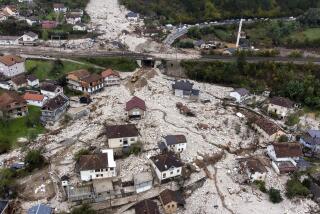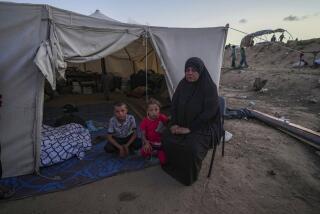Ethnic Discord : Uneasy Wait for Muslim Refugees : They fled Serbian concentration camps and found shelter in Croatia. But now, the Croats, too, may be their enemies.
KARLOVAC, Croatia — They were the victims of an often confusing war whose gaunt figures, bruised limbs and haunted eyes first helped the world outside Bosnia-Herzegovina understand what it meant to be “ethnically cleansed.”
From Serbian concentration camps these thousands of Muslim detainees made their way to a transit camp in neighboring Croatia, where they joined more than half a million refugees from Bosnia’s 14-month-old war awaiting an end to the fighting--or if the end doesn’t come, a home somewhere else.
But safety and shelter, in a war whose frontiers and alliances shift like light on water, can be fleeting things. As Croats and Muslims have turned against each other on the battlefields of central Bosnia in recent weeks, the hundreds of thousands of Muslim refugees sheltered in Croatia have begun to fear again for their future in a land that now may be the home of another enemy.
As images of Muslim troops ravaging Croatian villages in Bosnia play across newspaper front pages, veiled Muslim women on the streets of Zagreb say people now often mutter “dirty Muslim” at them as they pass. A small bomb exploded at a Muslim refugee center near the southern city of Split last week, and 680 Muslim refugees launched a protest when Croatian authorities attempted to move them to a new center they feared was too close to the war zone.
“They say there are half a million Muslim refugees in Croatia. And I ask myself if our Bosnian Muslim politicians ever think of us. Because we worry what is going to happen to us,” said one former inmate of the dreaded Omarska detention camp in western Bosnia. “We hang here on a string. We are standing neither on the earth nor in the sky. The world is promising things to us, and that is our only hope.”
Government officials on both sides fear the situation can only get worse. More than 3,000 Croatian refugees have arrived from Bosnia in the last week, and an estimated 20,000 more displaced from their homes in the fighting--some estimates are as high as 40,000--are in the forests around Travnik and in nearby Vares and Kakanj. Croatian authorities say many will probably try to make their way toward Croatia in the coming weeks--adding more fuel to an already explosive mixture of overcrowded facilities, an increasingly wary government and a hostile public.
Some of the hostility erupted visibly last week, when thousands of Croatian refugees, newly arrived from central Bosnia, were told they were being relocated back into Bosnia-Herzegovina, in part because Muslim refugees have flooded the existing facilities in Croatia. Angry protests broke out, and about 850 of them refused to go.
“I understand the rage of our citizens, but we don’t want this rage to get out of control,” said Adalbert Rebic, head of the Croatian Office for Refugees. “I’ll do anything in my power to try to appease the situation, and I beg my Muslim brothers to understand that we have to live together. If they don’t understand this, I foresee a very sad end.”
Already, hard-liners within the Croatian government have begun asking why Croatia is sheltering the wives and children of Muslim fighters who are killing Croats in neighboring Bosnia.
The fledgling nation, one of the first of the former Yugoslav republics to declare independence, has spent $1.6 billion sheltering refugees who number up to 12% of its own population. International aid has totaled only $38 million, Croatian authorities say, and Europe and the United States have been slow to welcome Bosnian refugees. So far, 595,000 have been settled abroad, leaving Croatia alone to shelter another 526,000 refugees. More than 261,000 of them are from Bosnia-Herzegovina, the rest Croats displaced from Croatian territories occupied by the Serbs.
“Croatia is exhausted. We have no more possibility to receive more refugees from Bosnia, and yet every day we are receiving 300,” said Rebic, who blames Serbia for instigating the latest round of Muslim-Croat fighting.
“This is another form of war against Croatia, by economic means,” he declared. “Maybe they’re hoping to give us another million refugees, so Croatia just breaks down.”
About three-fourths of the Bosnian refugees are Muslims, many of them housed in hotels along the scenic Adriatic coast in conditions that recently have begun to inspire envy among displaced Croats often sheltered in less comfortable circumstances.
“We cannot possibly understand how Muslims in Bosnia are attacking Croatians who are giving shelter to their families for such a long time. We cannot understand it, and we also feel that Muslim refugees have better conditions of life, much better,” said Silvija Zepan, who fled from the Croatian city of Vukovar two years ago when it was destroyed by the Serbs. Now, she and 750 of her neighbors live in a barracks on the outskirts of Zagreb, waiting for the seemingly distant day when the Croats take Vukovar back.
In what may be a sign of things to come, Croatian authorities announced last week that they would begin evicting Muslim residents living illegally in Croatian houses. They have taken similar actions against Croat refugees who do not have the proper papers.
The government also moved to transfer 680 Muslim refugees living in facilities on the Adriatic coast at Promajni to the Gasinci camp in western Croatia. The residents launched a protest, complaining that Gasinci was dangerously near the war zone.
“They said that they have to accommodate new refugees from central Bosnia, and that one ‘bad look’ can result in a confrontation, and that if that were to happen they would protect their own people (Croatians) and that no one could guarantee our safety and protection,” the Muslim refugees wrote in a letter of protest.
“We asked them what would happen if the refugees refused to board the buses? They replied: ‘If you don’t go voluntarily, you will go by force. This is not a market for bartering. You have no rights. You had better understand that this is not your republic.’ ”
After international authorities and the Bosnian government intervened, the transfer was delayed for two days and the government of Pakistan offered refuge. So far, only 280 of the refugees have accepted the offer.
Croatian authorities say they were obliged to move the refugees because the facility in which they were living had been bought by a private company that needed it to house workers in preparation for the upcoming tourist season. Many Croatian refugees have already been moved from similar facilities and hotels along the Adriatic coast for the same reason, they said.
“We are moving these refugees according to all world standards for their housing. None of them by now have to remain in the street, or even under a tent,” Rebic said. “We were shocked by their protests.”
In the streets of Zagreb, meanwhile, Muslims say they can already feel the chill of the worsening battles between Muslims and Croats in central Bosnia.
“It’s very difficult, because we feel we are all in danger now. People every day say things like, ‘Dirty Muslim’ or ‘We will kill you,’ ” said Edina, a young Muslim woman whose head scarf broadcasts her religious faith. “We can’t even go to school. They say they have no place. I said, ‘It’s because I’m a Muslim.’ ”
Another young Muslim housewife shook her head. “The people in the streets are asking us why don’t we go to Turkey, that’s where we came from, that’s where we belong. My children are also having problems at school. My son, the children mention his mother in a dirty way, and they are also hitting him,” she said. “I don’t think I will be able to stay here. But I don’t know where I will go. I think anywhere but Croatia.”
All of the official ex-detainees at Karlovac have now been guaranteed shelter in new countries after months in limbo, waiting for Europe and the United States to offer places. All but 300 have left. But many others without official paperwork are awaiting the results of interviews.
“Things are changing now, and since these conflicts with the Croats broke out, I don’t know what will happen to us,” said one young man, severely beaten during his months at the concentration camp at Manjaca. “I lost everything, all my property, and many of us lost our families. We have kept only this little bit of humanity, and now we fear revenge because of these events in Travnik.”
Croatian authorities admit that stemming the tide of public anger may be their most difficult task.
“Yesterday I received an anonymous letter from a Croatian citizen expressing grief and anger because Muslims have committed all the crimes and atrocities against Croats in central Bosnia,” said Rebic.”But we cannot blame Muslims globally because some of them committed war crimes. This is war, everybody against everybody.”
More to Read
Sign up for Essential California
The most important California stories and recommendations in your inbox every morning.
You may occasionally receive promotional content from the Los Angeles Times.










